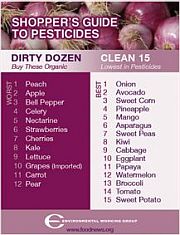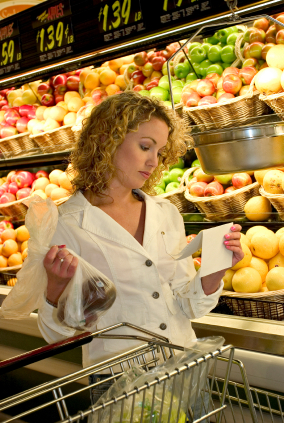Tip #7: Be a picky eater. Pare down the pesticides in your diet (without cutting too far into your food budget) by focusing your organic purchases on the “dirty dozen” fruits and veggies that tend to be chem-laden to the core.
 Buying local and organic as often as possible is a good way to help the planet and, more importantly, your health, but that doesn’t always mean it’s the easiest on your wallet. Organic foods can cost twice as much as conventional goods, but not all organics are created equal.
Buying local and organic as often as possible is a good way to help the planet and, more importantly, your health, but that doesn’t always mean it’s the easiest on your wallet. Organic foods can cost twice as much as conventional goods, but not all organics are created equal.
Put a paltry paycheck to good use by being picky about what you purchase. You can get the most bang for your organic buck by pocketing this handy-dandy guide of the most pesticide-prone fruits and veggies (as well as some of the safest). Says the Environmental Working Group of their “dirty dozen” list: “[P]eople can lower their pesticide exposure by almost 80 percent by avoiding the top 12 most contaminated fruits and vegetables and eating the least contaminated instead.”
Here’s the list:
- peach
- apple
- sweet bell pepper
- celery
- nectarine
- strawberries
- cherries
- kale
- lettuce
- grapes (imported)
- carrot
- pear
If you can’t afford to buy those guys organic, try switching them out for less scary, but similarly nutritious substitutes.
Screw Earth Day: Check out tips #1, 2, 3, 4, 5, and 6 for more advice on how to make every day Earth Day.



